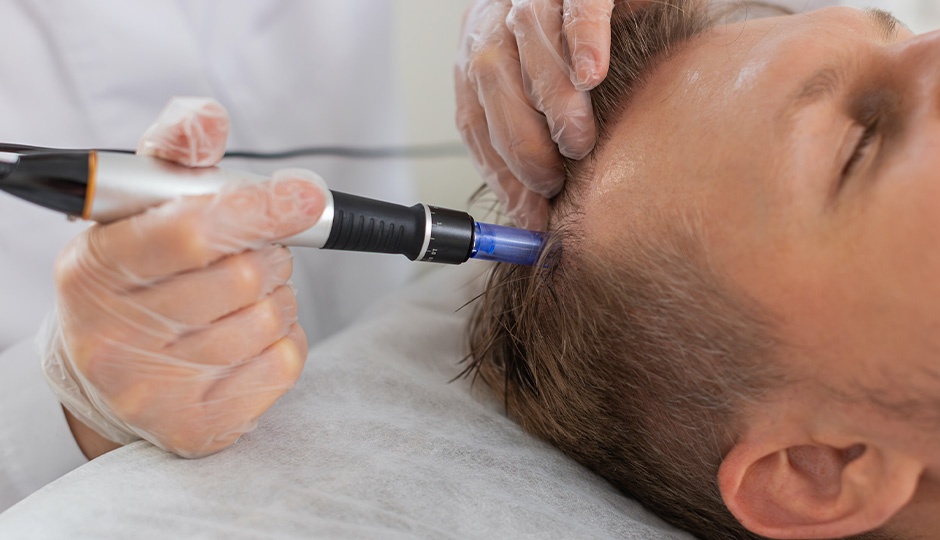“I’m heading off to bed – I need my beauty sleep.”
Have you ever heard someone say that or something like it? I’m sure you have. I’ve certainly said something similar in the past. And I know how much better I feel for a good night’s sleep, too.
If you think about the way you look and feel following a good night’s sleep – and how you feel after a bad night – it’s obvious that getting decent sleep is good for you. Let’s see how it affects your hair and skin in this post.
Does Sleep Quality Affect Hair?
Most of us know that sleep gives us a chance to repair and rest. This repair process covers the entire body, including our hair follicles. If we get enough sleep each night, various processes in the body allow optimal levels of hormones such as estrogen and melatonin. Estrogen levels are known to play a role in healthy hair growth. Women experiencing perimenopause are more likely to have thinning hair because of drops in estrogen levels. A lack of sleep doesn’t help either regardless of your age.
Getting poor sleep is also likely to increase your stress levels, especially if you are a New Yorker with a busy day ahead. This can raise your cortisol levels. Research indicates that increased cortisol levels may lead to hair loss or premature hair shedding, specifically a condition known as telogen effluvium.
If you do begin to experience hair loss, you may well notice more stray hairs than usual on your pillow. Tossing and turning during the night doesn’t help either. Swapping to a silk pillowcase may help to minimize any hair loss you experience if you are sleeping poorly. Of course, it makes sense to take other actions as well.
Does Sleep Quality Affect Your Skin?
Few of us think about our skin as an organ, but that’s exactly what it is. Sleep plays a crucial role in making sure we can maintain good-looking skin. We can see this most readily when we have a bad night. You’ve probably experienced bags under your eyes after poor sleep – I know I have.
Prolonged poor sleep can lead to a more aged appearance, since the individual has less sleep time to maintain and repair their body – and this includes the skin. When you first sink into sleep, your pituitary gland gets to work creating something called somatotropin. This is human growth hormone, and it helps to ensure our skin stays looking its best.
A night or two of bad sleep won’t cause any prolonged damage, but repeated bad nights will mean you get less cortisol and other hormones doing their job. That’s why it helps to do whatever you can to improve your sleep if you’ve had a few bad nights.
How To Improve Your Sleep
If you’ve been having trouble sleeping and you want to improve it to enjoy better hair and skin quality, look at your current routine to see what you can change. It’s best to avoid any screens for an hour or two before bed for starters. Ban them from your bedroom to make sure you aren’t tempted to pick them up if you cannot sleep.
Make sure your bedroom is dark too. Blackout curtains will help block any light coming from outside. Keep the room cool, using a fan in the summer months and adjusting heating in the cooler months to get the temperature just right.
Think about how you eat too, as that can influence how well (or badly) you sleep. Give yourself enough time to digest your food before you go to bed, otherwise you’ll feel uncomfortable. Avoiding caffeine is a good move too – I drink my last caffeinated drink for the day in the early afternoon, so it doesn’t affect my sleep. Some people are far more sensitive to this than others.
You can see how sleep quality is linked to hair health and skin health. It’s normal to have times when you can’t sleep well for whatever reason. The trick is to revert to normal as quickly as you can. There are lots of ways to keep your hair healthy and prevent hair loss, and sleeping well has a far bigger role to play than you might have thought.
Unique Hair Concepts is in Ardsley, New York in Westchester County, just 18 miles north of Midtown Manhattan. The center provides complimentary hair and scalp analysis. To learn more on how to maintain your hair and scalp health to promote healthy hair growth contact us to schedule an in-person consultation.






